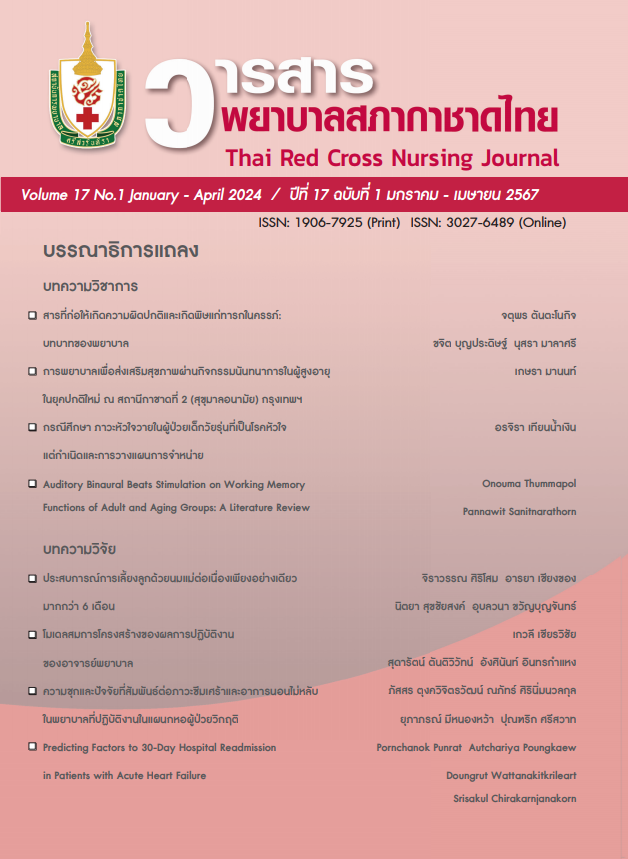The Experiences of Exclusive Breastfeeding over Six Months
Keywords:
exclusive breastfeeding, maternal experiences, working mothers, qualitative descriptive studyAbstract
This qualitative descriptive research aimed to explore the experiences of working mothers who exclusively breastfed over six months. Fifteen participants were purposively selected for the study based on the inclusion criteria of being full-time working mothers and engaging in exclusive breastfeeding for at least six months. The study was conducted in the Bueng Ka Sam community, located in the Nong Suea district of Pathum Thani province. Data were collected through in-depth interviews and analyzed using content analysis. The trustworthiness of the study was ensured by adhering to the criteria set by Lincoln and Guba.
The experiences of exclusive breastfeeding over six months reported by the mothers were captured into four major categories, which were: 1) intention to breastfeed, encompassing subcategories including knowledge of benefits of breast milk and breastfeeding to save money; 2) overcoming difficulties, which included subcategories of latching issues, insufficient milk supply, and reducing barriers; 3) support from family, colleagues, or neighbors, including family, employers and colleagues, and neighbors; and 4) outcomes of breastfeeding, including mother-child bonding and a sense of pride.
Findings from this study imply that working mothers had to manage their day-to-day breastfeeding in various situations to achieve exclusive breastfeeding for over 6 months, and they required support from various sources. It is suggested that health care professionals may need a long-term management plan and appropriate intervention program to better promote and support exclusive breastfeeding.
References
National Statistical Office. Project to survey the situation of children and women in Thailand 2019. Complete report. Bangkok: National Statistical Office; 2020. (in Thai)
Monteiro FR, Buccini GDS, Venâncio SI, da Costa THM. Influence of maternity leave on exclusive breastfeeding. J Pediatr 2017;93(5):475-81. doi:10.1016/j.jped.2016.11.016
Thepha T, Marais D, Bell J. Muangpin S. Perceptions of northeast Thai breastfeeding mothers regarding facilitators and barriers to six-month exclusive breastfeeding: focus group discussions. Int Breastfeed J 2018;13(14):1-10. doi:10.1186/s13006-018-0148-y
Prameswari GN, Kurnia AR. Qualitative study of exclusive breastfeeding succeeded among working mother. Advances in Health Science Research 2018;12:185-90. doi: 0.2991/isphe-18.2018.43
Phunpom C, Phahuwatanakorn W, Limruangrong P. Factors influencing a 6-month exclusive breastfeeding period in working mothers. Nursing Science Journal of Thailand 2020;38(1):47-59. (in Thai)
Rattasumpun S, Keawma B. Factors predicting successfulness in exclusive breastfeeding among working mothers. JRN-MHS 2018;38(4):14-24. (in Thai)
Abekah-Nkrumah G, Antwi MY, Nkrumah J, Gbagbo FY. Examining working mothers' experience of exclusive breastfeeding in Ghana. Int Breastfeed J 2020;15(1):56. doi: 10.1186/s13006-020-00300-0
Damchuti I, Kala S. Factors influencing the success of a 6-month exclusive breastfeeding period among working mothers. The Southern College Network Journal of Nursing and Public Health 2022;9(1):107-20. (in Thai)
Learkdumnearnkit P. Factors contributing to the success of exclusive breastfeeding for 6 months among: working mother in the lactation clinic health promotion center region 1 Chang Mai. Lanna Journal of Health Promotion and Environmental Health 2018;8(2):34-41. (in Thai)
Doyle L, McCabe C, Keogh B, Brady A, McCann M. An overview of the qualitative descriptive design within nursing research. J Res Nurs 2020;25(5):443-55. doi: 10.1177/ 1744987119880234
Lambert VA, Lambert CE. Qualitative descriptive research: an acceptable design. Pacific Rim Int J Nurs Res 2012;16(4):255-6.
Holloway I, Galvin K. Qualitative research in nursing and healthcare. 4thed. Chichester, West Sussex: John Wlley & Sons; 2017
Lincoln YS, Guba EG. Naturalistic inquiry. Newbury Park (CA): SAGE; 1985. doi:org/10.1016/0147-1767(85)90062-8.
Creswell JW. Research design: qualitative, quantitative and mixed methods approaches. 4th ed. London: Sage; 2014.
Ajzen I. The theory of planned behavior. Organ Behav Hum Decis Process 1991;50(2):179-211.
Sandelowski M. Whatever happened to qualitative description? Res Nurs Health 2000;23(4):334-40. doi:10.1002/1 098-240x(200008)23:43.0.co;2-g
Ritta W, Tachasuksri T, Suppasri P. Factors predicting exclusive breastfeeding intention for 6 months among working mothers in the industry. The Journal of Faculty of Nursing Burapha University 2020;28(3):66-78. (in Thai)
Pasuwan D. Success of exclusive breastfeeding for at least the first 6 months: a case study of Nakhon Pathom province. Kuakarun Journal of Nursing 2020;27(1):71-84. (in Thai)
Relaksana R, Akbar A, Sihaloho ED, Ferdian D, Siregar AY. The financial need of feeding infants for the first six months of life in West Java Province of Indonesia and the implications of socioeconomic and mental health factors. Int Breastfeed J 2023;18(1):26. doi: 10.1186/s13006-023-00561-5
Nutbeam D. Health literacy as a public health goal: a challenge for contemporary health education and communication strategies in to health 21st century. Health Promotion International 2000;15(3):259-67. doi: 10.1093/heapro/15.3.259
Office of the Surgeon General (US); Centers for Disease Control and Prevention (US); Office on Women's Health (US). The Surgeon General's Call to Action to Support Breastfeeding. Rockville (MD): Office of the Surgeon General (US). Barriers to breastfeeding in the United States [Internet]. 2011 [cited 2023 Jul 23] Available from: https://www.ncbi.nlm.nih.gov/books/NBK52688/
Quebu SR, Murray D, Okafor UB. Barriers to exclusive breastfeeding for mothers in Tswelopele municipality, free state province, South Africa: a qualitative study. Children (Basel) 2023;10(8):1380. doi:10.3390/children10081380
House JS. Social support and social structure. Sociol Forum 1987;2:135-46. doi:10.1007/BF01107897
Khaonark R, Kala S, Chatchawet W. Perception in breastfeeding of postpartum mothers with newborns hospitalized in neonatal intensive care unit. JRN-MHS 2020;40(1):30-44. (in Thai)
Lertsakornsiri M, Saibae S. The relationship between self-efficacy, self-esteem, attitude toward breastfeeding and breastfeeding behaviors in the first-time teenage postpartum mother
Downloads
Published
Issue
Section
License
Copyright (c) 2024 Srisavarindhira Thai Red Cross Institute of Nursing

This work is licensed under a Creative Commons Attribution-NonCommercial-NoDerivatives 4.0 International License.
เนื้อหาบทความหรือข้อคิดเห็นต่างๆ ในวารสารพยาบาลสภากาชาดไทยนี้ เป็นความคิดเห็นของผู้เขียนบทความ ไม่ใช่ความเห็นของกองบรรณาธิการ หรือสถาบันการพยาบาลศรีสวรินทิรา สภากาชาดไทย






